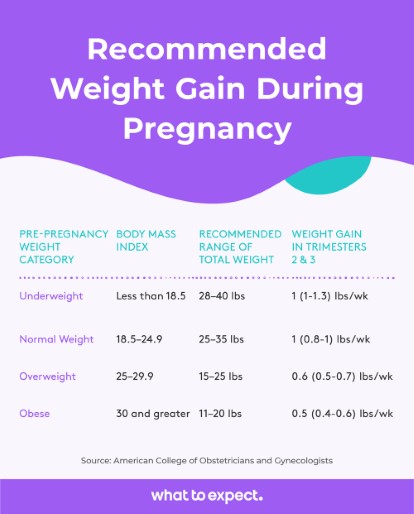Pregnancy is a time of great change in a woman’s body, and one of the most noticeable changes is weight gain. While it’s natural and necessary to gain weight during pregnancy, it’s important to aim for a healthy amount of weight gain to ensure the health of both you and your baby. So, what’s a healthy amount of weight gain during pregnancy, and how can you achieve it?
How Much Weight Should You Gain During Pregnancy?
The amount of weight you should gain during pregnancy depends on your pre-pregnancy weight and body mass index (BMI). In general, most women should gain somewhere between 25 and 35 pounds (11.5 to 16 kilograms) during pregnancy. Here are the general guidelines for healthy weight gain during pregnancy based on BMI:
- Underweight (BMI < 18.5): 28-40 pounds
- Healthy weight (BMI 18.5-24.9): 25-35 pounds
- Overweight (BMI 25-29.9): 15-25 pounds
- Obese (BMI > 30): 11-20 pounds
It’s important to note that these are just guidelines, and your individual needs may vary. Your doctor can help you determine the right amount of weight gain for you.
Tips for Healthy Weight Gain During Pregnancy
Here are some tips for achieving healthy weight gain during pregnancy:
- Eat a Balanced Diet: A balanced diet that includes plenty of fruits, vegetables, whole grains, and lean protein will help ensure that you and your baby are getting the nutrients you need. Limit processed foods, sugary drinks, and unhealthy fats.
- Stay Hydrated: Drinking plenty of fluids will help keep you and your baby hydrated and healthy.
- Get Regular Exercise: Regular exercise during pregnancy can help you maintain a healthy weight, reduce your risk of gestational diabetes, and improve your mood and energy levels.
- Talk to Your Doctor: It’s important to talk to your doctor about your weight gain goals and how to achieve them in a healthy way. They can help you create a plan that is right for you and your baby.
Additional Things to Keep in Mind About Pregnancy Weight Gain
Here are some additional things to keep in mind about pregnancy weight gain:
- Most of the weight you gain during pregnancy will be in the form of the baby, placenta, amniotic fluid, and increased blood volume.
- You will also gain some weight in the form of fat, which is needed to support your baby’s growth and development.
- It’s important to gain weight gradually throughout your pregnancy. Rapid weight gain can increase your risk of complications such as gestational diabetes, high blood pressure, and cesarean delivery.
- If you gain too little weight during pregnancy, your baby may be at risk for low birth weight.
- If you gain too much weight during pregnancy, you are at increased risk for complications such as gestational diabetes, high blood pressure, and cesarean delivery.
Working with your health care provider
Your medical professional will closely monitor your weight. You can do your part by eating a healthy diet. Additionally, getting at least 30 minutes of moderate-intensity exercise, such as brisk walking or swimming, is advised for the majority of pregnant women on most days. However, consult your doctor before beginning an exercise regimen. And be sure to keep your prenatal appointments. Your doctor may recommend increasing or decreasing calories as needed to help you maintain your pregnancy’s intended weight gain.
There is a problem with information submitted for this request. Review/update the information highlighted below and resubmit the form.
Could having a high BMI affect my ability to get pregnant?
High BMI can negatively impact fertility by preventing regular ovulation. Higher BMI can make it harder to get pregnant, even in women who ovulate regularly. Additionally, some studies indicate that a higher BMI is linked to a higher risk of in vitro fertilization (IVF) failure.
Pregnancy and obesity: Know the risks
If you’re worried about obesity and pregnancy, you should be aware of the dangers it poses as well as the ways to encourage a healthy pregnancy.
High body mass index (BMI) during pregnancy can have a significant negative impact on both your health and the health of your unborn child. Learn about the potential issues, weight-gain suggestions, and steps you can take to support a healthy pregnancy.
When a person’s BMI is 30 or higher, obesity is considered to be present. Divide your weight in pounds by your height in square inches, then multiply the result by 703 to get your BMI. Alternately, multiply your height in square meters by your weight in kilograms.
| BMI | Weight status |
|---|---|
| Source: Centers for Disease Control and Prevention | |
| Below 18.5 | Underweight |
| 18.5-24.9 | Standard range |
| 25.0-29.9 | Overweight |
| 30.0 and higher | Obesity |
Can Overweight Pregnant Women Diet to Restrict Their Weight Gain?
Conclusion
Pregnancy weight gain is a natural and necessary part of the process, but it’s important to aim for a healthy amount of weight gain to ensure the health of both you and your baby. Eating a balanced diet, staying hydrated, getting regular exercise, and talking to your doctor can all help you achieve healthy weight gain during pregnancy. By keeping these tips in mind and working closely with your doctor, you can ensure a healthy pregnancy and a healthy baby.

